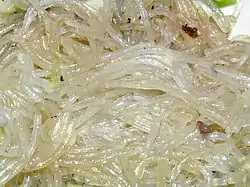春雨
Chinese
spring (time); gay; joyful spring (time); gay; joyful; youthful; love; lust; life |
rain | ||
|---|---|---|---|
| trad. (春雨) | 春 | 雨 | |
| simp. #(春雨) | 春 | 雨 | |
Pronunciation
Noun
春雨
Derived terms
- 春雨如油
- 春雨秋霜
- 春雨貴如油/春雨贵如油
- 杏花春雨
Japanese
Etymology 1

| Kanji in this term | |
|---|---|
| 春 | 雨 |
| はる Grade: 2 |
さめ Grade: 1 |
| kun’yomi | |
/parusame/ → /ɸarusame/ → /harusame/
Compound of 春 (haru, “spring”) + 雨 (ame, “rain”).[1][2] The medial -s- may represent epenthesis between two vowels, or it may be cognate with Korean interfix ㅅ (-s-) used to mark possession, much like English -'s. See also 小雨 (kosame, “drizzle”) and 稲 (shine, “rice”).
Noun
春雨 • (harusame)
- spring rain
- cellophane noodle, glass noodle – a type of transparent Asian noodle made from starch (such as mung bean starch, potato or canna starch), and water.
Etymology 2
| Kanji in this term | |
|---|---|
| 春 | 雨 |
| しゅん Grade: 2 |
う Grade: 1 |
| on’yomi | |
Borrowing from Middle Chinese 春雨 (MC tsyhwin hjuX, “spring + rain”).
References
- Shōgaku Tosho (1988) 国語大辞典(新装版) [Unabridged Dictionary of Japanese (Revised Edition)] (in Japanese), Tōkyō: Shogakukan, →ISBN
- Matsumura, Akira, editor (2006), 大辞林 [Daijirin] (in Japanese), Third edition, Tōkyō: Sanseidō, →ISBN
This article is issued from Wiktionary. The text is licensed under Creative Commons - Attribution - Sharealike. Additional terms may apply for the media files.